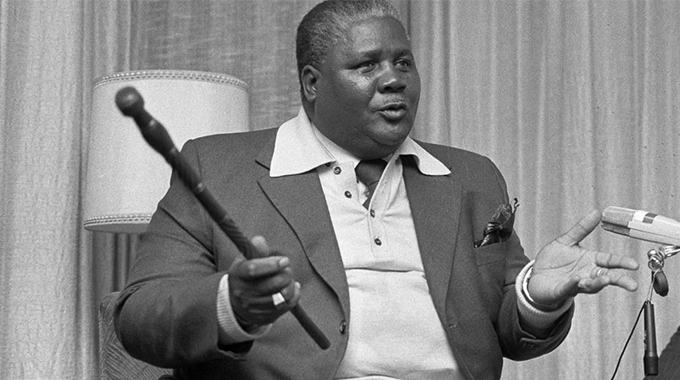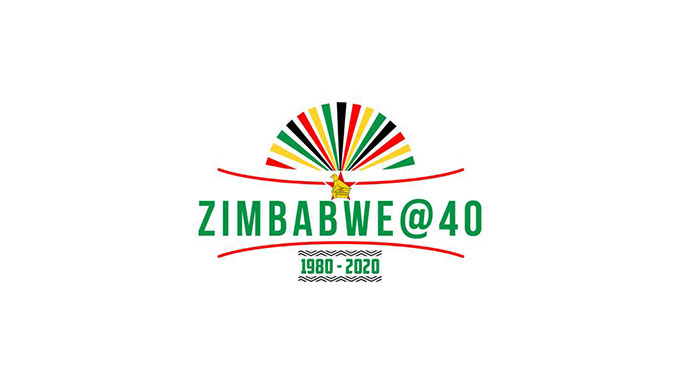
The Sunday News

Dr Obert Mpofu
There is no better joy to loyalists of nationalism than having Zimbabwe’s 40th Independence anniversary being celebrated in Bulawayo. The City of Kings and Queens is the birthplace of the late Dr Joshua Nkomo’s anti-imperialist career. While I want to commend President Emmerson Mnangagwa for taking the bold step to devolve national commemorations, I am certain that Big Josh is happy with President Mnangagwa’s decision to decentralise this sacred day in the national calendar.
The initiative substantiates affirmative inclination of the current administration in embracing all Zimbabweans as benefactors of the liberation struggle. The decentralised celebration of our Independence Day deeply resonates with the plural political culture which was born out of Cde Joshua Nkomo’s fidelity to the ideological bonds of unity, inclusive governance and equality of all citizens of this land. Therefore, President Mnangagwa has tactfully aligned his style of governance to the tenets of the anti-colonial philosophy which is grossly attached to the legacy of Father-Zimbabwe. Through this experience, the premise of legacy restoration which conceived the New Dispensation in 2017 becomes overwhelmingly floodlit. The new ritualisation of Independence Day celebrations hardly two years after the birth of the Second-Republic must not be isolated from the nationwide renaming of our streets. This is proof that the President Mnangagwa administration is committed to marrying the present with our perennial liberation aspirations. These key national aspirations are derived from the dedicated sacrifices of our liberation doyens especially Cde Joshua Mqabuko Nyongolo Nkomo.
Mqabuko and the Making of the Nation
The independence of Zimbabwe cannot be discussed without acknowledging the centrifugal role of Dr Joshua Nkomo in the fight against colonialism. His iconic and towering role as a nation-builder resides at the apex of our national liberation and the entirety of our post-independence politics. Therefore, my humble contribution to the freedom of Zimbabwe is directly linked to the African nationalist trajectory which was conceived and put into action by the Late Father Zimbabwe, Dr Joshua Mqabuko Nyongolo Nkomo. His role as the founder of African nationalism in Zimbabwe, as well as his short-lived political demise in the face of the post-independence disturbances and later, his political resurgence as a beacon of national unity depicts the fluidity of his illustrious political career.

The late Dr Joshua Nkomo
In Rhodesia, Dr Nkomo spent more than a decade in political detention and after independence he was in exile for 10 years. This time he was being “protected” by the same colonial powers which were involved in underhand politics to ensure that his links to the Soviet Union were utterly dismembered. As if that is not enough, today some imperialist reactionaries have appropriated his legacy to foster the polarisation of our people. We have seen an increased reactionary academic emphasis about Dr Nkomo and Zapu’s political victimhood to cement notions of disunity in Zimbabwe. The recent fashionable turn to Zapu/ZPRA memorialisation by imperialist opportunists has been exploited to historicise Dr Nkomo as a perpetual victim of the pre-Unity Accord political disturbances. This narrow location of Dr Joshua Nkomo in history has been used to engender ethnic tensions and project Zimbabwe as a “failed state”, yet it is known that Dr Nkomo was the core master-builder of the Unity Accord signed in 1987. Before independence, the nationalist movement was born out of regional balancing. Even after the Zapu split of 1963 leading to the birth of Zanu as a breakaway fragment in the fight against colonialism and the 1971 internal tensions in Zapu which led to the rise of Frolizi, Dr Nkomo embraced the idea of the amalgamation of Zapu and Zanu in 1976 hence the creation of the Patriotic Front. The Patriotic Front spearheaded the peace conciliations right up to the Lancaster Conference. Without doubt, Dr Nkomo valued national interest over personal ambition.
Through the mirror of Dr Nkomo’s political journey, it is easy to situate the path we have traversed as a nation in the search for our liberation. It is also through Dr Nkomo’s giant nationalist steps, in the face of his entanglement in the race and ethnic schisms of Zimbabwean belonging from which we can evaluate the achievements of pan-African nationalism in Zimbabwe. However, his praise name, “Father Zimbabwe” benchmarks the authenticity of his credentials in contributing to the realisation of a united Zimbabwe.
In locating my role in the power dynamics of Zimbabwe, I cannot avoid expressing how my passion for the liberation of Zimbabwe is directly intertwined to the ideological personhood of Father Zimbabwe. To this end, I am forever thankful to him for the inspiration which his life (sacrificed for the love of this country) remains a perennial sanctuary for my political existence. My involvement in the struggle for liberation was directly inspired by the foundation which Dr Nkomo had set through the establishment of Southern Rhodesia African National Congress (SRANC). The fast paced radicalisation of the fight against colonialism then compelled me to join both ZPRA and Zapu in 1967. Dr Nkomo presided over these two liberation institutions. Through the internal support which he attracted for the cause of our freedom, I was trained in military reconnaissance leading to my pro-active role in the Hwange (Wankie) and Sipolilo Battles between 1967 and 1969.
A Champion of Social Justice and a Nationalist
In socio-economic and political terms, Dr Joshua Nkomo was a product of an oppressive and dispossessing colonial system. His family, just like many other African families, were victims of marginal agrarian policies which triggered the fight for freedom. Therefore, Dr Nkomo’s anti-imperialist stance resonated with the existing conditions of colonial repression. In the same vein, nationalist mobilisation was grounded on the African nationalist driven stubbornness to undo colonial domination. The quest for equality between the oppressed majority and the ruling minority became the rallying point for the political reform which Dr Nkomo was advocating for.
The colonial administration dismissed his political reform advocacy. In response, Dr Nkomo took a leading role in organising the labour movement in Bulawayo to redress capitalist injustices. Thus, Dr Nkomo was active in organising mass labour protests with the immense support of Africans serving in the Rhodesian Railways which was headquartered in Bulawayo between 1945 and 1948. His continued fight against the disenfranchisement of the African workers mapped his profound sphere of political influence. After engaging with Thompson Samukange (a Methodist Cleric in Makokoba) in 1952 resulting in his full membership to the SRANC, Dr Nkomo rose to prominence as the president of this political organisation in 1957. Dr Nkomo was deputised by Cde James Robert Dambaza Chikerema who was the then president of the Harare City Youth League. Cde Chikerema advocated for the amalgamation of both SRANC and the Harare City Youth League. Dr Nkomo’s SRANC presidency coincided with the independence of Ghana in March 1957. As a result, he transformed the social rights advocacy of the SRANC and gave it a radical political outlook. From 1957 the Dr Nkomo-led SRANC began championing the one man, one vote principle which became the initial rallying point for nationalist mobilisation. At this point, the nationalist movement was beginning to assert its existence as a political force worth the envy and agitation of the colonial regime. This resulted in the banning of the SRANC in 1959 leading to the birth of the National Democratic Party (NDP).

The formation of the NDP intensified the defiant calls for democratisation and constitutional reform to pave way for the inclusion of African nationalist interests in the governance of Southern-Rhodesia. This resulted in the British Constitutional Conference of 1961 and it was resolved that the regime will open up 15 of 65 seats for occupation by the nationalists. This arrangement compromised the possibilities of fast-tracking majority rule. Consequently, Dr Nkomo’s inner circle was offended by this decision. However, his action was based on his futuristic ambitions for inclusive participation of the nationalist movement in decision-making. Britain declared that it would remain distant from the internal affairs of Southern-Rhodesia.
After the prominent riots which led to Dr Nkomo and other nationalists’ arrests, the People’s Caretakers Council was formed to serve as the face of Zapu’s banished political activity. While in incarceration since 1964, Dr Nkomo kept his hopes high that the country was going to be free from colonial rule. The mobilisation on the ground and the ongoing military operations at the time prove that Dr Nkomo led the armed struggle from prison. This also proves the magnitude of his charisma. For 11 years Zapu’s faith in Dr Nkomo was not lost. On the other hand, he was optimistic in the people’s victory. After his release from prison, in 1974, Dr Nkomo was adamant to seeing our people becoming masters of their destiny. A year later after his release from prison, I met him for the first time in person in Victoria-Falls.
Coming to know Umdala Wethu
The stride set by Dr Nkomo in the fight against colonialism made him a hero to both my generation and that of our parents. Today, his legacy is an indelible mark of our people’s self-determination. As I was growing up, Dr Nkomo was revered as an unparalleled liberator. The people affectionately adored Dr Nkomo, hence the reference to him as Umdala. After independence, he was then referred to as Umdala Wethu loosely translated as Our Father. Beyond the commemorative attribute of his fatherhood to the rest of the nation, Dr Nkomo became a surrogate father to those of us who served in various ranks of the armed struggle. Having lost my father at the age of seven and joining the struggle at the age of 15, the veteran nationalists who groomed me and my other contemporaries assumed a surrogate status of fatherhood. Subsequently, Dr Nkomo as the father of nationalist resistance became an arch-father because his charisma permeated into all the operations of the liberation struggle.
In my entire childhood, Dr Nkomo posed as a bulwark symbol of liberation for the oppressed. This way, he was a father to the entire oppressed world. He was indeed an endeared character, his name was countlessly mentioned in my own family homestead and in the whole community. My elder siblings had been members of the NDP and were card-holding members of this political organisation. Like any other African born in Rhodesia, my political socialisation was grounded on the racist designed oppression. By the time I was mature to read between good and bad, the only existing institution which was opposed to the racist regime was Zapu. It was in the values of Zapu where I initially came face to face with the vision which Dr Joshua Nkomo had for a free Zimbabwe. My second encounter with Dr Joshua Nkomo — the idea was when I joined ZPRA. In ZPRA I was taught patriotism, vigilance and loyalty to principle.
Again, it was in ZPRA where my anti-colonial ideological resolve was established and cemented. To this day, I am adamantly opposed to any type of oppression and all prejudices which facilitate inequality and dehumanisation. It was in the struggle, where I was humanised and in response I was ideologically equipped to rehumanise my people in the hands of White minority rule. In Zapu, I was taught the cardinal principle of reclaiming the stolen.
– The author Dr Obert Moses Mpofu is Zanu-PF’s Secretary for Administration and a Member of the Politburo.



